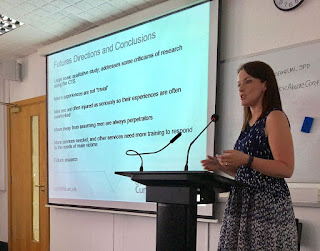Bereavement Support
 |
| Emma Barton |
One of my areas of interest, which I am passionate about, is bereavement. Specifically, how we support people when they are grieving. As a society, we are not very good at talking about death. Because, for most of us, it is not part of our normal discourse, often we are uncomfortable with the subject and don’t know what to say to people who are bereaved. We worry that we might say the wrong thing, that we might upset them, or make them cry, so often we don’t say anything at all. Grief is painful but it can also be lonely and isolating as well.
The experience of grief can be very difficult. It is
painful, very tiring and emotions can be so strong and unpredictable that many
feel they are going mad. The emotions people feel often include feelings of guilt,
or anger. Anger in particular is a difficult emotion to express within our
society – we are taught from a very young age that anger is not nice and that
we should control or suppress it. When strong feelings of anger are felt
towards someone who has died, or towards the professionals who cared for them,
this can be difficult to cope with, especially when people feel it is not
socially acceptable. The support role is about listening to people’s stories of
their experiences but it is often largely about normalising it too.
I trained and volunteered with a local hospice charity as a
family and bereavement support worker. After a bit of a break, as work and home
became very busy, I am currently revisiting and refreshing my training with
them so that I can return to this role. I have missed it while I’ve been away,
it is one of the most rewarding things I have ever done and I feel privileged
to have been alongside people in their grief. The role itself involves
providing one to one support for people. This may well be after the death of a
loved one but might also be after a diagnosis of a life-limiting illness, when
people and their families sometimes need some extra support.
The majority of people are able to use their friends and
family for support when they are grieving and will never need to access more
formal support. Sometimes though, people feel that they have nobody to talk to,
or that they don’t want to ‘burden’ their friends and families with their
feelings. Sometimes the support role involves helping to explore the option of
accessing social support, as well as providing a listening ear when people need
it.
If you'd be interested in volunteering opportunities within bereavement support in Cumbria then please contact either Hospice at Home (West Cumbria or Carlisle and North Lakeland) or Eden Valley Hospice.
Emma Barton is one of our Psychology Lecturers. If you would like to contact her then please email her on Emma.Barton@cumbria.ac.uk
Emma Barton is one of our Psychology Lecturers. If you would like to contact her then please email her on Emma.Barton@cumbria.ac.uk


I very much enjoyed this post; it's always nice to see that one's gut instincts (providing judgment-free listening) are appropriate. Also, the point about life-limiting illnesses requiring extra support is an excellent one, and particularly relevant under the current government.
ReplyDelete